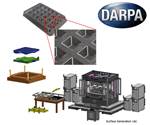DARPA dubs new hybrid-electric X-plane XRG-73
Scaled Composites, Cornerstone Research Group and others are supplying the uncrewed aircraft, which will mature a long-endurance aircraft design.
The Defense Advanced Research Projects Agency (DARPA, Arlington, Va., U.S.) has assigned the designation XRQ-73 to its Series Hybrid Electric Propulsion AiRcraft Demonstration (SHEPARD) hybrid-electric uncrewed aircraft system.
SHEPARD is an “X-prime” program, leveraging the series hybrid-electric architecture and some of the component technologies from the earlier AFRL/IARPA Great Horned Owl (GHO) project, which sought to extend the operational endurance and payload capabilities for intelligence surveillance and reconnaissance (ISR) unmanned aerial vehicles (UAVs).
“The idea behind a DARPA X-prime program is to take emerging technologies and burn down system-level integration risks to quickly mature a new missionized long-endurance aircraft design that can be fielded quickly,” says Steve Komadina, SHEPARD program manager. “The SHEPARD program is maturing a specific propulsion architecture and power class as an exemplar of potential benefits for the Department of Defense.”
The DARPA team includes members from the Air Force Research Laboratory (AFRL), the Office of Naval Research (ONR) and warfighters.
The prime contractor for SHEPARD is Northrop Grumman Corp.’s Aeronautics Systems (Redondo Beach, Calif., U.S.) sector. Aerospace and composites R&D company Scaled Composites LLC (Mojave) is a major supplier, along with Cornerstone Research Group Inc., Brayton Energy LLC, PC Krause and Associates and EaglePicher Technologies LLC.
The XRQ-73 aircraft will be a Group 3 UAS weighing approximately 1,250 pounds. First flight of the XRQ-73 is expected by year-end 2024.
For related content, read “DARPA shows concepts for future VTOL uncrewed aerial systems.”
Related Content
-
“Structured air” TPS safeguards composite structures
Powered by an 85% air/15% pure polyimide aerogel, Blueshift’s novel material system protects structures during transient thermal events from -200°C to beyond 2400°C for rockets, battery boxes and more.
-
Farnborough Airshow 2024 brings together aerospace innovation, collaboration
The week-long international airshow provided a hub for new announcements made by Boom Supersonic, Airbus, Boeing, GKN, GE, ZeroAvia, Eve, Bell, VoltAero, Eve and Lilium. CW has compiled several below.
-
US Air Force selects Integris Composites ballistic body armor
Cratus Wave armor is thin, lightweight and reduces heat stress, providing buoyant personal protection for the 582nd Helicopter Group.

















